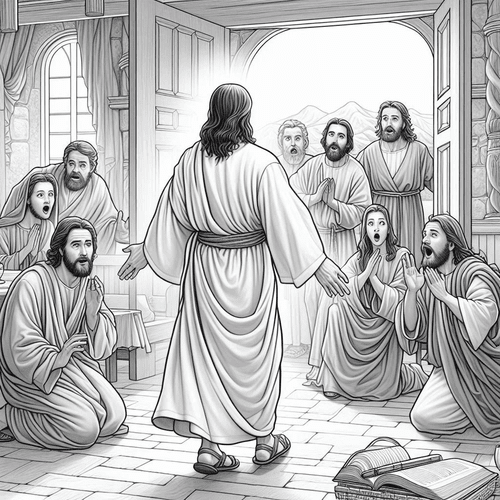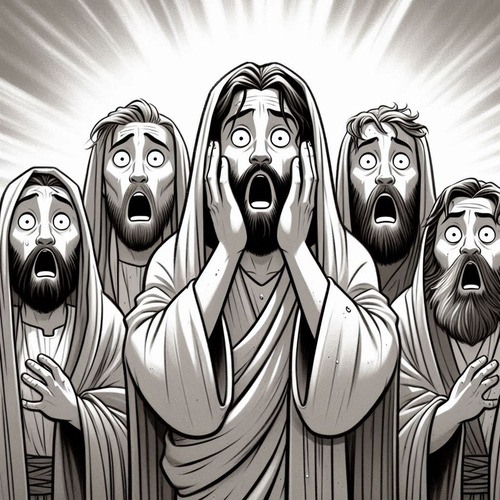Does the Bible Clearly Teach the Deity of Christ?
Critics argue Jesus never explicitly claimed to be God. Others suggest the doctrine emerged centuries later through philosophical speculation. But does Scripture itself provide clear, compelling evidence for the full deity of Christ? The answer is a resounding, emphatic yes. The Bible presents overwhelming, multi-faceted testimony that Jesus of Nazareth isn’t merely a great teacher or prophet, but God incarnate—the eternal Son who shares fully in the divine nature.
DIRECT DECLARATIONS OF CHRIST’S DEITY
Does the Bible clearly teach the deity of Christ? The most straightforward examples are Scripture’s explicit declarations. The Gospel of John opens with the stunning proclamation: “In the beginning was the Word, and the Word was with God, and the Word was God” (John 1:1). The Greek construction here is unmistakable—it affirms the Word (Jesus) possesses the full essence of deity while maintaining personal distinction from the Father.
This isn’t an isolated statement. When the risen Christ appeared to His disciples, Thomas fell before Him declaring, “My Lord and my God!” (John 20:28). Significantly, Jesus received this worship rather than correcting it—a response that would have been blasphemous if He were merely human.
The apostolic writings continue this theme. Paul refers to Christ as “our great God and Saviour Jesus Christ” (Titus 2:13), using a grammatical construction that applies both titles to the same person. Similarly, Romans 9:5 identifies Christ as “God over all, blessed forever.”
Perhaps most dramatically, Jesus applied the divine name to Himself. When confronted by hostile Jews, he declared, “Before Abraham was, I am” (John 8:58)—a clear echo of God’s self-revelation to Moses as “I AM WHO I AM” (Exodus 3:14). The Jews understood His claim perfectly, and even proceeded to attempt to stone Him. For blasphemy.
DIVINE ATTRIBUTES ASCRIBED TO CHRIST
Beyond explicit declarations, Scripture consistently attributes divine characteristics to Christ that belong to God alone. These “incommunicable attributes” cannot be shared with created beings.
Eternality marks Christ throughout Scripture. Micah 5:2 speaks of one whose “goings forth have been from of old, from everlasting.” Jesus Himself claimed, “Before Abraham was, I am” (John 8:58), asserting existence before time. Revelation presents Him as “the Alpha and the Omega, the first and the last” (Revelation 1:8).
Immutability characterises Christ as “the same yesterday and today and forever” (Hebrews 13:8). Unlike created beings who change and develop, Christ possesses the divine attribute of unchanging perfection.
Omnipresence appears in Christ’s promise: “Where two or three are gathered in my name, there am I among them” (Matthew 18:20). His assurance to be with his people “always, to the end of the age” (Matthew 28:20) claims universal presence impossible for any creature.
Omniscience is demonstrated when His disciples acknowledge, “Now we know that you know all things” (John 16:30). Paul declares that in Christ “are hidden all the treasures of wisdom and knowledge” (Colossians 2:3).
Status as Creator: Most remarkably, Scripture identifies Christ as Creator. John 1:3 states categorically: “All things were made through him, and without him was not anything made that was made.” Colossians 1:16-17 expands this: “By him all things were created… and in him all things hold together.” Only God creates ex nihilo and sustains all existence.
DIVINE PREROGATIVES AND WORSHIP
Scripture consistently shows Christ exercising prerogatives that belong exclusively to God. When a paralytic was brought to Him, Jesus declared, “Son, your sins are forgiven” (Mark 2:5). The scribes rightly observed “only God can forgive sins”—yet rather than correcting their theology, Jesus demonstrated His authority by healing the man, proving His divine prerogative to forgive.
Throughout the Gospels, Christ receives worship that Scripture reserves for God alone. After walking on water, his disciples “worshiped him, saying, ‘Truly you are the Son of God’” (Matthew 14:33). The formerly blind man “worshiped” Jesus (John 9:38). Philippians 2:9-11 declares that every knee will bow to Jesus—language drawn directly from Isaiah’s description of worship due to Yahweh alone.
Christ also claims the divine prerogative of final judgment. “The Father… has given all judgment to the Son, that all may honour the Son, just as they honour the Father” (John 5:22-23). This authority over eternal destinies belongs to God alone.
DIVINE WORKS AND TRINITARIAN TESTIMONY
Christ’s deity is further confirmed through works that Scripture attributes exclusively to God. Most dramatically, Jesus demonstrated power over death itself—the ultimate enemy only the Creator can conquer. He raised Jairus’ daughter (Luke 8:54-55), the widow’s son at Nain (Luke 7:14-15), and Lazarus after the latter was four days in the tomb (John 11:43-44). These weren’t mere resuscitations but demonstrations of life-giving power that belongs to God alone, as Jesus declared: “I am the resurrection and the life” (John 11:25).
Christ’s own resurrection provides the ultimate vindication of His divine claims. Paul argues Christ “was declared to be the Son of God in power… by his resurrection from the dead” (Romans 1:4). No mere human could conquer death permanently and bodily, rising in glorified immortality.
Remarkably, the Trinity also testifies to Christ’s deity. At His baptism, the Father’s voice declared, “This is my beloved Son, with whom I am well pleased” (Matthew 3:17), while the Spirit descended upon him. The Father again testified at the Transfiguration: “This is my beloved Son… listen to him” (Matthew 17:5). The Holy Spirit’s role in Christ’s conception (Luke 1:35) and His anointing for ministry (Luke 4:18) demonstrate the Trinity’s unified testimony to the Son’s divine identity.
THE OLD TESTAMENT FOUNDATION
The Hebrew Scriptures anticipated this revelation. Isaiah prophesied the coming child would be called “Mighty God, Everlasting Father” (Isaiah 9:6). The promised Immanuel would be “God with us” (Isaiah 7:14). Jeremiah spoke of the Messiah as “The LORD our righteousness” (Jeremiah 23:6), applying the divine name directly.
The mysterious “Angel of the LORD” throughout the Old Testament receives worship and speaks as God Himself, prefiguring the incarnation where deity takes on human nature.
REFORMED THEOLOGICAL SIGNIFICANCE
From a Reformed perspective, Christ’s deity isn’t merely academic—it’s soteriologically essential. Only God can accomplish the redemption of sinners. A mere creature, however exalted, could never bear the infinite weight of divine wrath or merit eternal righteousness for God’s people. The Reformed emphasis on God’s sovereignty in salvation requires a divine Saviour who can effectually accomplish what He promises.
CONCLUSION
So, does the Bible teach the deity of Christ? The biblical evidence for Christ’s deity isn’t based on a single proof-text but represents the cumulative testimony of the entire scriptural revelation. From explicit declarations to divine attributes, from receiving worship to exercising divine prerogatives, the Bible consistently presents Jesus Christ as fully God and fully man—the eternal Son incarnate.
This truth shouldn’t remain merely intellectual. If Jesus is indeed God, then He deserves our absolute worship, trust, and obedience. The deity of Christ transforms how we read Scripture, approach prayer, and live the Christian life. As Thomas discovered, encountering the risen Christ inevitably leads to the confession: “My Lord and my God!”
DOES THE BIBLE TEACH THE DEITY OF CHRIST? RELATED FAQs
What is the significance of Jesus’s “I AM” statements in John’s Gospel? Jesus made seven explicit “I AM” statements that carry profound theological weight beyond their surface meaning. These declarations (“I am the bread of life,” “I am the light of the world,” etc.) echo God’s self-revelation to Moses as “I AM WHO I AM” (Exodus 3:14), the sacred divine name YHWH. When Jesus said “Before Abraham was, I am” (John 8:58), He wasn’t just claiming pre-existence—He was identifying Himself with the eternal, self-existent God of Israel. The Jews’ immediate attempt to stone Him reveals they understood His claim to deity perfectly.
- How do we view the relationship between Christ’s deity and the doctrine of the Trinity? Reformed theologians like John Calvin and later scholars such as BB Warfield emphasised Christ’s deity is inseparable from Trinitarian doctrine. They argued Scripture reveals one God existing eternally in three distinct persons—Father, Son, and Holy Spirit—who share the same divine essence. Calvin particularly stressed the Son’s deity isn’t derived from the Father but is inherent and eternal. This understanding protects against subordinationist errors and maintains personal distinctions within the Godhead. Westminster Confession 2.3 articulates this as “three persons, of one substance, power, and eternity.”
- Why didn’t Jesus explicitly say “I am God” in plain terms? Jesus’s indirect approach served multiple theological and practical purposes. Direct claims to deity would have immediately triggered charges of blasphemy and premature martyrdom, cutting short His earthly ministry. Instead, Jesus revealed His divine identity progressively through actions, attributes, and carefully chosen words that demonstrated deity while allowing for spiritual discernment. His method also fulfilled Old Testament patterns where God’s identity was revealed through mighty acts and divine names rather than philosophical propositions. The cumulative evidence required faith to perceive, separating genuine seekers from mere curiosity-seekers.
How do we reconcile Christ’s deity with passages that seem to show His limitations or subordination to the Father? Reformed theology addresses this through the doctrine of the two natures—Christ is fully God and fully man in one person (hypostatic union). Passages showing limitations (hunger, thirst, death) refer to His human nature, while passages showing divine attributes refer to His divine nature. Statements about the Father being “greater” (John 14:28) reflect economic subordination—the Son’s voluntary role in redemption—not ontological inferiority. Calvin emphasised that Christ’s submission concerns his mediatorial office, not his essential deity. The incarnate Son willingly took a subordinate role functionally while remaining equal in essence.
- What role does the Old Testament “Angel of the LORD” play in understanding Christ’s pre-incarnate appearances? Many Reformed scholars identify the “Angel of the LORD” as pre-incarnate appearances of the second person of the Trinity. This mysterious figure receives worship (Genesis 16:13, Judges 13:20), speaks as God himself, and is identified as both distinct from and identical with YHWH. These theophanies prepare for the incarnation by showing God can appear in human-like form while remaining fully divine. Theologians like Geerhardus Vos argued these appearances demonstrate the Son’s eternal role as the visible manifestation of the invisible God. They provide Old Testament precedent for the incarnation’s possibility.
- How does Christ’s deity relate to His role as the perfect sacrifice for sin? Reformed soteriology insists only a divine person can bear the infinite weight of God’s wrath against sin. A mere creature, however perfect, lacks the infinite dignity necessary to make adequate atonement for sins against an infinitely holy God. Christ’s divine nature gives infinite value to his sacrifice, making it sufficient for countless sinners throughout history. Additionally, only God possesses the holiness necessary to remain unstained by contact with sin while bearing its penalty. His deity also ensures the certainty of salvation—God cannot fail in His redemptive work.
What is the historical development of the doctrine of Christ’s deity in Reformed confessions? The doctrine crystallised through major Reformed confessions responding to various heresies. The Belgic Confession (1561) affirmed Christ as “true and eternal God” against Arian influences. The Westminster Confession (1646) provided detailed Trinitarian formulations, stating Christ is “very God and very man, yet one Christ.” The Canons of Dort (1619) implicitly relied on Christ’s deity for effective atonement. Later Reformed scholars like Charles Hodge and BB Warfield developed sophisticated defences against liberal theology’s challenges. These confessions demonstrate Christ’s deity wasn’t a late development but was central to Reformed identity from its inception.
DOES THE BIBLE TEACH THE DEITY OF CHRIST? OUR RELATED POSTS
Editor's Pick

From Empty to Overflow: The Abundant Life Jesus Promised
(AND WHY YOU SHOULDN’T SETTLE FOR LESS) We're surviving, but are we thriving? If we're honest, there's a gap between [...]

What Does Jesus Save Us From?
THREE BIBLE TRUTHS ABOUT SALVATION "Jesus saves." We’ve seen it on bumper stickers, heard it shouted at sporting events, maybe [...]

If God Wants Everyone Saved, Why Aren’t They?
THE REFORMED VIEW ON GOD’S DESIRE VS HIS DECREE The question haunts every believer who has lost an unbelieving loved [...]

The One Man Mystery in Acts 17:26: Is It Adam Or Noah?
When the Apostle Paul stood before the philosophers at Mars Hill, he delivered an insightful statement about human unity: “And [...]

Megiddo Or Jerusalem: Where Did King Josiah Die?
Recent archaeological discoveries at Tel Megiddo continue to reveal evidence of Egyptian military presence during the late 7th century BC, [...]

Losing Your Life Vs Wasting It: How Are the Two Different?
AND WHY DID JESUS PRAISE THE FORMER? Jesus spoke one of the most perplexing statements in Scripture: “For whoever wants [...]

Can Christians Be Demon Possessed? What the Bible Teaches
Perhaps you’ve witnessed disturbing behavior in a professing Christian, or you’ve struggled with persistent sin and wondered if something darker [...]

Sacred Fury: What Christ’s Temple Cleansing Truly Means
Mark 11 records the crack of a handmade whip that echoed through the temple corridors. Tables crashed to the ground, [...]

Did Jesus Cleanse the Temple Twice?
OR DID JOHN DISAGREE WITH THE SYNOPTICS ON TIMING? One of sceptics’ favourite "gotcha" questions targets what they see as [...]

Self-Authentication: Why Scripture Doesn’t Need External Validation
"How can the Bible prove itself? Isn't that circular reasoning?" This objection echoes through university classrooms, coffee shop discussions, and [...]
SUPPORT US:
Feel the Holy Spirit's gentle nudge to partner with us?
Donate Online:
Account Name: TRUTHS TO DIE FOR FOUNDATION
Account Number: 10243565459
Bank IFSC: IDFB0043391
Bank Name: IDFC FIRST BANK






